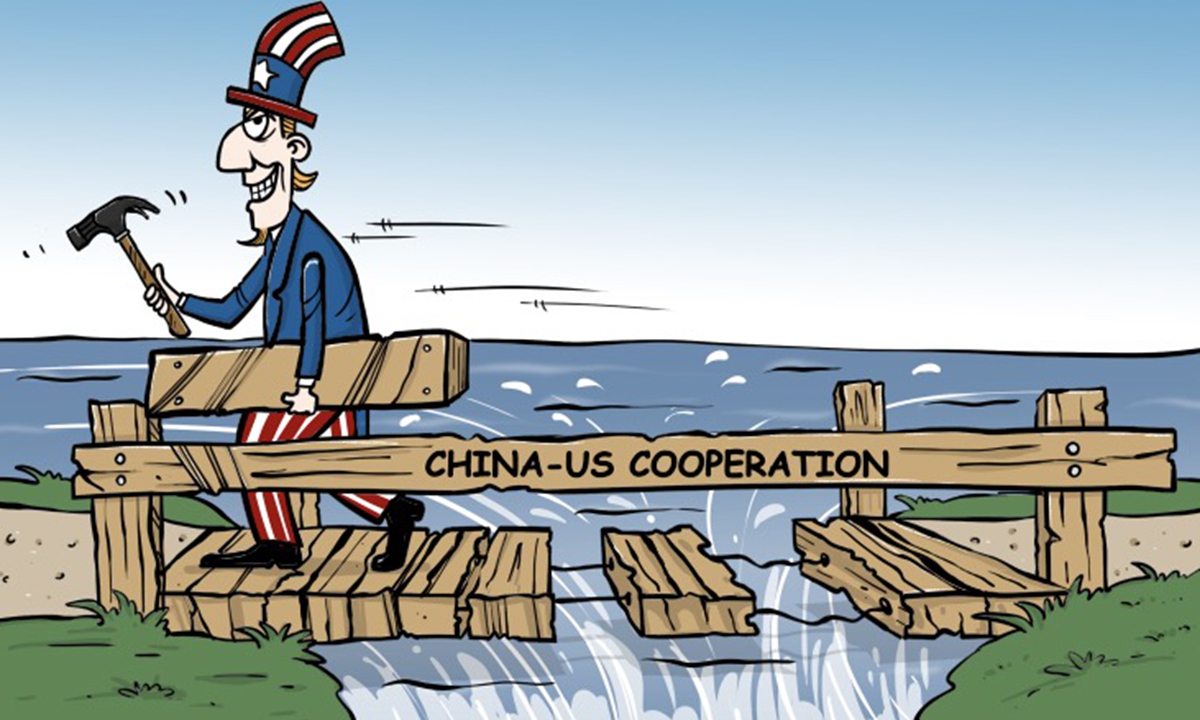Pelosi's Taiwan trip may push China's reunification
2024-10-16 19:22:19本站

Illustration: Chen Xia/GT
A new Taiwan Straits crisis could break out. If Nancy Pelosi, speaker of the US House of Representatives, finally decides to visit Taiwan island during her official trip to Asia, or citing any private reasons, it will definitely have a huge impact on the remaining foundation of cooperation in China-US relations. This could also firm up China's determination to fight against US provocations and make the US pay the bitter price it deserves. To a certain extent, it will also accelerate the process of China's reunification.An old Chinese saying goes "avoid being too pushy to avoid being pushed aside." The US should learn from it. The US in recent years has been making waves, which, I believe, has made it increasingly impossible for China to help and cooperate with US interests on issues such as trade, manufacturing, debt, and anti-terrorism, if the US has such demands in future.
Pelosi should abandon any potential Taiwan trip. This is what she is supposed to do. If she gives up, that means the US still has a clear estimation of itself and it would also remind the US that this is a completely unnecessary diplomatic event. The US government should understand that repeatedly playing tricks and especially playing with fire over the Taiwan question won't bring the US benefits, but losses.
The US should know that China is not a country to be trifled with. There is room for negotiations over some ordinary issues. But when key issues and China's core interests are concerned, the Chinese people will definitely fight to the end. The Taiwan question is now more and more like the "gray rhino" in China-US relations. Once a crisis breaks out, the US is sure to be the first one to be hit by the "gray rhino."
There is possibility of a Taiwan Straits crisis breaking out. But China is not afraid of such a crisis and is confident in managing it. China has gradually become familiar with the US approaches against China over the past 40 years, especially in the past four or five years. From the trade war, to Xinjiang and South China Sea issues, to Hong Kong and human rights affairs, and now to the Taiwan question, China has been more adept and powerful in counterattacking US provocations.
Pelosi's back-and-forth moves over the Taiwan question in the past few months reflect US politicians' short-sightedness and the country's strategic bluff as a paper tiger. It's obvious that American politicians have underestimated China's strategic will to safeguard national sovereignty.
Some American scholars believe that China will stress "confrontation without wreckage."Indeed, not having a war with the US is the last line of defense that China has always hoped to maintain in its competition with the US. But if China's core interests are in jeopardy, there is no need to adhere to the last line of defense. This is the current strategic will of China.
Chinese President Xi Jinping warned that "Those who play with fire will perish by it" in a call with US President Joe Biden on Thursday, which has demonstrated China's strategic determination.
Concerning Pelosi's potential visit to the island of Taiwan, the Chinese mainland has enough contingency plans. Over the years, China's strategy of "gaining mastery by striking only after the enemy has struck" has worked.
For example, the US launched the trade war, and China fought back. The result is China-US total volume of trade and China's total surplus with the US has in fact increased, instead of falling. The US tech war against China has forced China to become independent in its technology strategy. The US making an issue of the Hong Kong affair has accelerated the enactment of China's national security law for Hong Kong. The US is bound to meet China's strategic countermeasures under China's "gaining mastery by striking only after the enemy has struck" strategy.
However, I still believe in the ultimate strategic rationality of China and US. In fact, the two heads of state have some consensus, such as avoiding the outbreak of a new cold war, avoiding strategic misjudgment and military conflict, etc. The two leaders have recognized that the relationship between the two countries is currently facing many disturbance factors, and we must have a "brake" mechanism at the head of state level before the worst scenario occurs.
From this perspective, irregular communications between the two leaders can not only guide bilateral relations, but also reflect the necessary responsibility that the two heads of state must assume for the world stability. I sincerely hope that head-of-state diplomacy can help head off a disaster.
The author is executive dean of Chongyang Institute for Financial Studies at Renmin University of China. [email protected]
文章地址:http://mobile.dalian183.cn/html/752d798489.html (转载请注明出处)
免责声明:本文仅代表作者个人观点,与本网站无关。其原创性以及文中陈述文字和内容未经本站证实,对本文以及其中全部或者部分内容、文字的真实性、完整性、及时性本站不作任何保证或承诺,请读者仅作参考,并请自行核实相关内容。